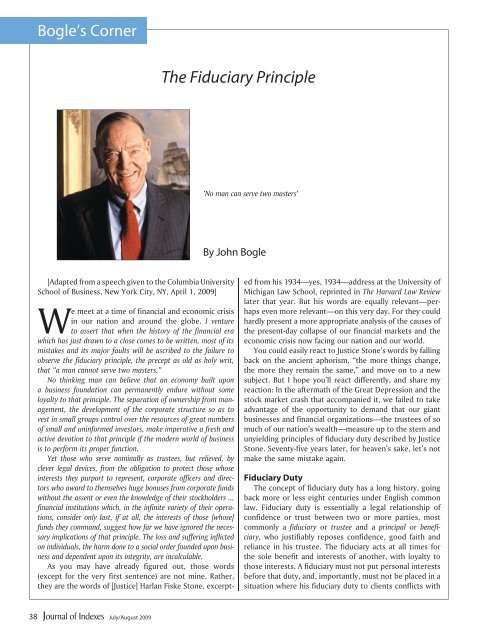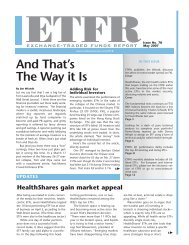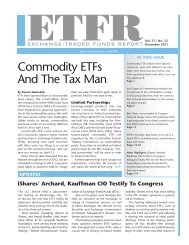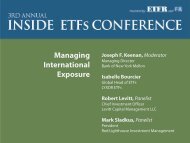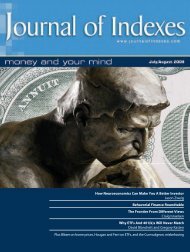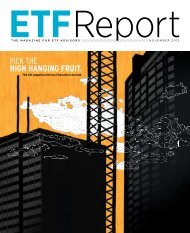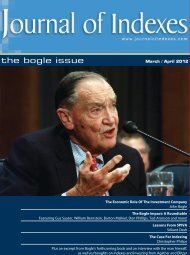How to Kill a Black Swan Remy Briand and David Owyong ...
How to Kill a Black Swan Remy Briand and David Owyong ...
How to Kill a Black Swan Remy Briand and David Owyong ...
You also want an ePaper? Increase the reach of your titles
YUMPU automatically turns print PDFs into web optimized ePapers that Google loves.
Bogle’s Corner<br />
The Fiduciary Principle<br />
‘No man can serve two masters’<br />
By John Bogle<br />
[Adapted from a speech given <strong>to</strong> the Columbia University<br />
School of Business, New York City, NY, April 1, 2009]<br />
We meet at a time of financial <strong>and</strong> economic crisis<br />
in our nation <strong>and</strong> around the globe. I venture<br />
<strong>to</strong> assert that when the his<strong>to</strong>ry of the financial era<br />
which has just drawn <strong>to</strong> a close comes <strong>to</strong> be written, most of its<br />
mistakes <strong>and</strong> its major faults will be ascribed <strong>to</strong> the failure <strong>to</strong><br />
observe the fiduciary principle, the precept as old as holy writ,<br />
that “a man cannot serve two masters.”<br />
No thinking man can believe that an economy built upon<br />
a business foundation can permanently endure without some<br />
loyalty <strong>to</strong> that principle. The separation of ownership from management,<br />
the development of the corporate structure so as <strong>to</strong><br />
vest in small groups control over the resources of great numbers<br />
of small <strong>and</strong> uninformed inves<strong>to</strong>rs, make imperative a fresh <strong>and</strong><br />
active devotion <strong>to</strong> that principle if the modern world of business<br />
is <strong>to</strong> perform its proper function.<br />
Yet those who serve nominally as trustees, but relieved, by<br />
clever legal devices, from the obligation <strong>to</strong> protect those whose<br />
interests they purport <strong>to</strong> represent, corporate officers <strong>and</strong> direc<strong>to</strong>rs<br />
who award <strong>to</strong> themselves huge bonuses from corporate funds<br />
without the assent or even the knowledge of their s<strong>to</strong>ckholders ...<br />
financial institutions which, in the infinite variety of their operations,<br />
consider only last, if at all, the interests of those [whose]<br />
funds they comm<strong>and</strong>, suggest how far we have ignored the necessary<br />
implications of that principle. The loss <strong>and</strong> suffering inflicted<br />
on individuals, the harm done <strong>to</strong> a social order founded upon business<br />
<strong>and</strong> dependent upon its integrity, are incalculable.<br />
As you may have already figured out, those words<br />
(except for the very first sentence) are not mine. Rather,<br />
they are the words of [Justice] Harlan Fiske S<strong>to</strong>ne, excerpted<br />
from his 1934—yes, 1934—address at the University of<br />
Michigan Law School, reprinted in The Harvard Law Review<br />
later that year. But his words are equally relevant—perhaps<br />
even more relevant—on this very day. For they could<br />
hardly present a more appropriate analysis of the causes of<br />
the present-day collapse of our financial markets <strong>and</strong> the<br />
economic crisis now facing our nation <strong>and</strong> our world.<br />
You could easily react <strong>to</strong> Justice S<strong>to</strong>ne’s words by falling<br />
back on the ancient aphorism, “the more things change,<br />
the more they remain the same,” <strong>and</strong> move on <strong>to</strong> a new<br />
subject. But I hope you’ll react differently, <strong>and</strong> share my<br />
reaction: In the aftermath of the Great Depression <strong>and</strong> the<br />
s<strong>to</strong>ck market crash that accompanied it, we failed <strong>to</strong> take<br />
advantage of the opportunity <strong>to</strong> dem<strong>and</strong> that our giant<br />
businesses <strong>and</strong> financial organizations—the trustees of so<br />
much of our nation’s wealth—measure up <strong>to</strong> the stern <strong>and</strong><br />
unyielding principles of fiduciary duty described by Justice<br />
S<strong>to</strong>ne. Seventy-five years later, for heaven’s sake, let’s not<br />
make the same mistake again.<br />
Fiduciary Duty<br />
The concept of fiduciary duty has a long his<strong>to</strong>ry, going<br />
back more or less eight centuries under English common<br />
law. Fiduciary duty is essentially a legal relationship of<br />
confidence or trust between two or more parties, most<br />
commonly a fiduciary or trustee <strong>and</strong> a principal or beneficiary,<br />
who justifiably reposes confidence, good faith <strong>and</strong><br />
reliance in his trustee. The fiduciary acts at all times for<br />
the sole benefit <strong>and</strong> interests of another, with loyalty <strong>to</strong><br />
those interests. A fiduciary must not put personal interests<br />
before that duty, <strong>and</strong>, importantly, must not be placed in a<br />
situation where his fiduciary duty <strong>to</strong> clients conflicts with<br />
38<br />
July/August 2009


